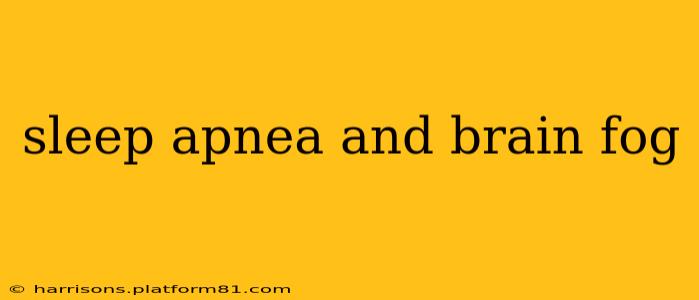Brain fog. That frustrating feeling of mental cloudiness, difficulty concentrating, and impaired memory. For many, it's a daily struggle, and for those with sleep apnea, it's often a significant symptom. This article explores the strong link between sleep apnea and brain fog, explaining the mechanisms involved and outlining ways to manage both conditions.
What is Sleep Apnea?
Sleep apnea is a serious sleep disorder characterized by pauses in breathing during sleep. These pauses can last from a few seconds to minutes, and they can happen repeatedly throughout the night, disrupting your sleep cycle and depriving your brain of vital oxygen. There are two main types:
- Obstructive Sleep Apnea (OSA): The most common type, where the airway becomes blocked during sleep.
- Central Sleep Apnea (CSA): A less common type, where the brain doesn't send the correct signals to the muscles that control breathing.
The severity of sleep apnea is measured by the Apnea-Hypopnea Index (AHI), which represents the number of apnea and hypopnea events (partial airway blockages) per hour of sleep. A higher AHI indicates more severe sleep apnea.
How Does Sleep Apnea Cause Brain Fog?
The connection between sleep apnea and brain fog is multifaceted:
- Oxygen Deprivation: Repeated pauses in breathing during sleep lead to drops in blood oxygen levels. This oxygen deprivation affects brain function, leading to cognitive impairment.
- Sleep Fragmentation: Sleep apnea disrupts the sleep cycle, preventing you from achieving restorative deep sleep and REM sleep. This fragmented sleep leaves you feeling unrefreshed and impacts cognitive performance.
- Increased Inflammation: Sleep apnea is associated with chronic inflammation throughout the body, including the brain. This inflammation can contribute to cognitive dysfunction and brain fog.
- Hormonal Imbalances: Sleep apnea can disrupt the production of hormones crucial for cognitive function, such as cortisol and growth hormone.
What are the Symptoms of Brain Fog Related to Sleep Apnea?
Experiencing brain fog alongside other symptoms of sleep apnea strongly suggests a connection. These brain fog symptoms might include:
- Difficulty concentrating: Finding it hard to focus on tasks or conversations.
- Memory problems: Forgetfulness, trouble recalling information, and difficulty learning new things.
- Poor judgment: Making impulsive decisions or struggling with problem-solving.
- Slowed thinking: Feeling mentally sluggish and experiencing delayed reaction times.
- Lack of motivation: Feeling uninspired and struggling to initiate tasks.
- Headaches: Frequent headaches, often upon waking.
Can Sleep Apnea Cause Memory Loss?
Yes, sleep apnea can contribute to memory problems and even potentially long-term memory loss if left untreated. The repeated oxygen deprivation and sleep disruption damage brain cells over time, potentially impairing memory function.
How is Sleep Apnea Diagnosed?
A sleep study, often called a polysomnography, is the most accurate way to diagnose sleep apnea. This involves monitoring your brain waves, heart rate, breathing, and oxygen levels during sleep. A home sleep apnea test (HSAT) may also be used in some cases.
What are the Treatments for Sleep Apnea?
Treatment for sleep apnea aims to improve breathing during sleep and restore normal sleep patterns. Common treatments include:
- Continuous Positive Airway Pressure (CPAP): A machine that delivers a continuous flow of air pressure through a mask, keeping the airway open.
- Oral Appliances: Custom-made mouthpieces that reposition the jaw and tongue to prevent airway obstruction.
- Surgery: In some cases, surgery may be an option to correct anatomical issues contributing to sleep apnea.
- Lifestyle Changes: Weight loss, avoiding alcohol and sedatives before bed, and sleeping on your side can help manage sleep apnea.
How Can I Improve Brain Fog Associated with Sleep Apnea?
Addressing the underlying sleep apnea is crucial for alleviating brain fog. In addition to treatment for sleep apnea, consider these strategies:
- Prioritize Sleep Hygiene: Establish a consistent sleep schedule, create a relaxing bedtime routine, and ensure a dark, quiet sleep environment.
- Manage Stress: Stress can exacerbate sleep apnea and brain fog. Incorporate stress-reducing techniques like meditation or yoga.
- Improve Diet: A balanced diet rich in fruits, vegetables, and whole grains can support brain health.
- Regular Exercise: Physical activity promotes better sleep and overall cognitive function.
Addressing sleep apnea and the resulting brain fog requires a comprehensive approach. By understanding the connection between these two conditions and seeking appropriate treatment, individuals can significantly improve their cognitive function and overall quality of life. If you suspect you might have sleep apnea, consult a healthcare professional for diagnosis and treatment.
